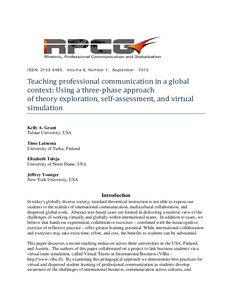Teaching professional communication in a global context: Using a three-phase approach of theory exploration, self-assessment, and virtual simulation
Grant Kelly A.; Lainema Timo; Tuleja Elizabeth; Younger Jeffrey
https://urn.fi/URN:NBN:fi-fe2021042715148
Tiivistelmä
In today's globally diverse society, standard theoretical instruction is not able to expose our students to the realities of international communication, multicultural collaboration, and dispersed global work. Abstract text-based cases are limited in delivering a realistic view of the challenges of working virtually and globally within international teams. In addition to cases, we believe that hands-on experiential, collaborative exercises – combined with the metacognitive exercise of reflective practice – offer greater learning potential. While international collaboration and exercises may take extra time, effort, and cost, the benefits to students can be substantial. This paper discusses a recent teaching endeavor across three universities in the USA, Finland, and Austria. The authors of this paper collaborated on a project to link business students via a virtual team simulation, called Virtual Teams in International Business (VIBu - http://www.vibu.fi). By examining this pedagogical approach we demonstrate best practices for virtual and dispersed student learning of professional communication as students develop awareness of the challenges of international business, communication across cultures, and dispersed global work. We posit that exposing business students to the authentic complexity and ambiguity of modern virtual and dispersed work results in relevant learning and deeper understanding of the applicable topics. This case-learning environment requires that the instructor relinquish full control within the learning situation and give the responsibility to the students to act, organize and learn, but the learning that results from this empowerment may be considerable.
Kokoelmat
- Rinnakkaistallenteet [27094]
